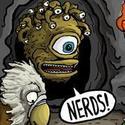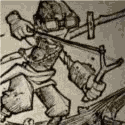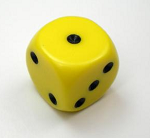|
In my campaign I had one PC's parents and another PC's brother show up as antagonists. Being family saved them from death.
|
|
|
|
|

|
| # ? Jun 11, 2024 01:07 |
|
Hot tip: create a semi-mysterious and powerful seeming early enemy with a little character that isn't actually important or powerful. Have the enemy killed in a way that leaves a sliver of a doubt that maybe they were not killed. Watch your players obsess over this character with expectations that they got away and are behind everything, constantly paranoid they'll turn up again, constantly worried everything is a trap left by said mysterious enemy. I accidentally did this, thought it was clear the person was killed, but almost every mystery that came after was pinned on this guy and it was always assumed he'd be some end-boss or behind it all. It was good fun. Just make sure to never let their interest temp you into bringing this person back, that would cheapen the experience.
|
|
|
|
sebmojo posted:Rich Burlew of order of the stick does great villains, he wrote a good blog on it. This is a pretty good guide, but one thing it doesn't cover is having multiple villains that interact with each other. I've always been a fan of having multiple villains that are conspiring against each other, so that players can slip in the middle and start mucking things up. The key to this is looking for points of interaction in the various plans, where two different plots both require the same resource for different or explicitly opposing reasons. It sounds like a clusterfuck, but it's actually not that hard once you get the various balls rolling-- although you do have to take more notes.
|
|
|
|
Ironically, it's easiest to have memorable villains in games that aren't about fighting, because you can have them show up without it being a fight.
|
|
|
|
Baronjutter posted:Hot tip: create a semi-mysterious and powerful seeming early enemy with a little character that isn't actually important or powerful. Have the enemy killed in a way that leaves a sliver of a doubt that maybe they were not killed. Watch your players obsess over this character with expectations that they got away and are behind everything, constantly paranoid they'll turn up again, constantly worried everything is a trap left by said mysterious enemy. Noooo totally bring them back. Take your time, but do it. your players will love it. Sometimes it's ok to give people what they want, you know?
|
|
|
|
Iunnrais posted:This is a pretty good guide, but one thing it doesn't cover is having multiple villains that interact with each other. I've always been a fan of having multiple villains that are conspiring against each other, so that players can slip in the middle and start mucking things up. The key to this is looking for points of interaction in the various plans, where two different plots both require the same resource for different or explicitly opposing reasons. It sounds like a clusterfuck, but it's actually not that hard once you get the various balls rolling-- although you do have to take more notes. that way you can have a 'we are not so different, you and i' scene and have them TEAM UP with one of the villains before the crucial backstab scene! e: vv yep sebmojo fucked around with this message at 10:13 on Dec 8, 2015 |
|
|
|
sebmojo posted:that way you can have a 'we are not so different, you and i' scene and have them TEAM UP with one of the villains before the crucial backstab scene! A decent way to introduce a villain is to have him be somehow necessary for the PCs' plan. Like he's the only one in the country that can translate these ancient runes (because he killed everyone else that could and is leveraging his knowledge to make power grabs, but they don't know that yet). And he plays it absolutely straight with the PCs and their translation job, because they won't be in position to use the info they find before his plan approaches completion. "Yeah, he cackles and rubs his hands a bit, and he takes "publish or perish" a little literally, but really, there's no one better for your purposes."
|
|
|
|
cheetah7071 posted:Ironically, it's easiest to have memorable villains in games that aren't about fighting, because you can have them show up without it being a fight. Seriously. Have them show up in the King's council, or the masquerade ball, or whatever. The person they KNOW is behind all this showing up when they absolutely cannot do anything aggressive. I mean, they will anyway, but that's when it gets fun.
|
|
|
|
Iunnrais posted:This is a pretty good guide, but one thing it doesn't cover is having multiple villains that interact with each other. I've always been a fan of having multiple villains that are conspiring against each other, so that players can slip in the middle and start mucking things up. The key to this is looking for points of interaction in the various plans, where two different plots both require the same resource for different or explicitly opposing reasons. It sounds like a clusterfuck, but it's actually not that hard once you get the various balls rolling-- although you do have to take more notes.
|
|
|
|
cheetah7071 posted:Ironically, it's easiest to have memorable villains in games that aren't about fighting, because you can have them show up without it being a fight. Oh, totes. My most memorable villain so far was a demon antagonist in a supernatural investigators game, because she was a naturally recurring character. Until they could figure out a way to permanently destroy her, any defeat only meant a temporary banishment. It owned because this way she could take control of a situation and they didn't have recourse to violence, they had to outsmart her. Boy does that make the players hate and fear an enemy. The game I'm running now is the opposite of that: few to no supernatural elements, only relatively grounded near-future sci-fi stuff, the world is violent and lawless and anyone can be killed. So that kind of thing is a lot harder to pull off without either loving with the internal consistency of the setting or doing out-of-tone stuff like the "bad guy has overwhelming force, but just gloats and leaves" trope. DivineCoffeeBinge posted:The best villains are former heroes. Oh my god, this is perfect and I can't believe it didn't occur to me. It fits perfectly with the theme of their responsibility for the community, it's natural that some of their choices will come back to bite them in the rear end like that. Especially the I can totally work in the "stealing a love interest" thing, too. One of the PC's is finishing up his major character arc (becoming a true leader) and his current goal is to secure an alliance with neighboring tribals by marrying their chief's daughter. I'll throw in the classic rival suitor, see if it sticks.
|
|
|
|
Guildencrantz posted:Oh my god, this is perfect and I can't believe it didn't occur to me. It fits perfectly with the theme of their responsibility for the community, it's natural that some of their choices will come back to bite them in the rear end like that. Especially the When they get up to unquestionably heinous poo poo that gives you even more fertile ground. Say - for example - the PCs destroy a small village loyal to Enemy Faction B. Being PCs and thus likely to believe in going all-in on their actions, they probably raze it to the ground or somesuch. Okay, so you sneak in a survivor - a scout who was out of town or a dude who hid under wreckage or whatever. Now when he starts raising forces to oppose the PCs, he's able to gather a lot of support in a short amount of time because he's entirely in the right - he's a Good and Honest Man seeking revenge on the people that killed his family. It's always interesting when the Bad Guy is actually a Good Guy. Another thing you can consider is the antagonist that seeks to antagonize - not to defeat. Readers of the Notable Gaming Stories thread might recall that some time ago I was posting regarding a Star Wars campaign I was in. A (not really) quick recap of one of those stories: Back in the early days of the game the PCs - using forged credentials as members of Imperial Intelligence - had encountered an Imperial spy who was very, very good at his job. He saw through the PCs even when the local Imperial hierarchy was completely fooled by them, and he was a master of disguise and stealth and essentially he had to be removed ASAP. So the team captured him, froze him in Carbonite, and shipped him off to Rebel Intelligence while planting evidence that he'd defected to the Rebel Alliance. The plan was that the Rebels could interrogate him and gain valuable intel. It... didn't work out so well, and he escaped captivity (off-screen; we didn't find out about this for ages). Unfortunately, now the Rebels were hunting him for being an Imperial and the Imperials were hunting him for being a defector. So he decided to come after the PCs, and snuck into our flagship (by this point we were on a Victory-class Star Destroyer that we'd, um, acquired). But he didn't want to kill the PCs. That would be too easy. He wanted to fight, as the Princess Bride said it, "to the pain." So he did poo poo like eavesdrop on our plans and then leave little notes in the Rebel leader's cabin about how stupid the plans were, or drop ball bearings into moving spaceship parts so they'd rattle around and drive people crazy, or put Ex-Lax into ration packs, or whatever else he could think of that would just make people miserable. Once we were broken, then he could kill us. It took literal RL years before we actually got around to dealing with this problem - other stuff just kept on happening! - but when we did, and we, as players, learned just how long the GM had been stringing this out, we were floored. It was a fun, memorable, and engaging adversary that didn't have to have life-or-death stakes. Those are always fun.
|
|
|
|
Did that dude live for like 4 years stealing outta the Star Destroyer pantry holed up in a warren of wires he'd converted into a bunk on sub-level B? Though when I think about it it's probably not much worse than just straight up having a starship cabin... Anyway, a question for the thread. We're using a *World knockoff, so the way you gain XP is by following a personal directive to the detriment of the rest of the group. One of my players chose (well, made up) the addicted directive, which is basically he gets XP if he indulges in his addiction to the detriment of everyone else. The thing is, I'm trying to think of a way to mechanically encourage this besides the XP, because I get the feeling we're going to forget it if we just leave it to RP. Minor bonuses from alcohol that swing around the more he drinks? Chances for alcohol to help or hinder? On the other hand, I'm not sure of or why this directive in particular should get any special treatment. Anyone care to chime in?
|
|
|
|
Jintor posted:Did that dude live for like 4 years stealing outta the Star Destroyer pantry holed up in a warren of wires he'd converted into a bunk on sub-level B? Though when I think about it it's probably not much worse than just straight up having a starship cabin... Yup! ...well, to be fair, after four years he'd made it pretty homey. When we finally tracked him down - most of the group went after him and failed miserably while I hunted down his nest and just waited for him to come back, and when he did he shrugged and surrendered - he had his own little coffee maker and bunk and pictures hanging up and all kinds of stuff. Dude was dedicated.
|
|
|
|
DivineCoffeeBinge posted:Another thing you can consider is the antagonist that seeks to antagonize - not to defeat. This makes me think of one of my favorite villainous archetypes: the crucible. They might be sadistic. They might not quite have their heart in it. They might be a henchman with ulterior motives. They might be running a long con. They might be deluded into thinking they're taking some sort of karmic weight upon their shoulders to fill a necessary role. They might actually be doing so. Whatever their reasoning, they don't want to win, so much as they want to create someone (or a group) in opposition to them that can make them lose. They're doing all sorts of evil villain things, but they're doing it to provoke a response. They're Goliath with a death wish, screaming for a worthy challenger. They'll still kill you if you're not measuring up, of course. It wouldn't do to have someone sub-par accidentally ruin the whole thing. But a villain that's quietly rooting for the heroes, while still trying their damnedest to actually win 95% of the time, can provide a whole lot of really interesting plot points.
|
|
|
|
Guildencrantz posted:I need a brainstorm. Any tips for designing cool, recurring villains for a campaign?
|
|
|
|
Golden Bee posted:Who sez? Give your players index cards with stats like "+2 bootlicker: Roll with Something Extra when you blame your failures on someone else." Do a scene where the Villain deals with his underlings. Or better yet, have the players be sympathetic monsters, and have the villain kill'em. The players will hate him forever. The 4e DMG had some fantastic advice and examples along these lines.
|
|
|
|
So I'm about to GM a proper campaign for the first time. I've been GM for some one-shot adventures, mostly World of Darkness. This will be for the Star Wars: Edge of the Empire. What I really want is to wing it a lot and just make as much up on the fly as possible. That being said, some planning is probably good. Locations, characters, story hooks, etc. The Obligation system is really good for that, as it makes each character have a story hook that can come into play. What are your experiences with really freeform GMing? What should I keep in mind or have planned? How can you encourage a group to take matters into their own hands regarding the plot and course of the game?
|
|
|
|
Bolverkur posted:So I'm about to GM a proper campaign for the first time. I've been GM for some one-shot adventures, mostly World of Darkness. This will be for the Star Wars: Edge of the Empire. What I really want is to wing it a lot and just make as much up on the fly as possible. That being said, some planning is probably good. Locations, characters, story hooks, etc. The Obligation system is really good for that, as it makes each character have a story hook that can come into play. Just think on your feet, always say "Yes and..." Don't be nervous, and keep notes in case you forget an npc's name or something. A whiteboard with graph lines / a chessex battlemap helps as well to doodle out boxes and things. I spent $150 on heroscape terrain, but god please don't do that it was an expensive impulse buy and I wiped out like 3 online gaming shop's entire inventory. If there's something that you really don't want them to do, (Which should be very rare since you're planning nothing.) Just set the DC to like 35 or 40 and tell them that. Here's what's helped me for creating NPC's on the fly quote:Start every character with at least one relationship to another character: And use this as well: https://www.wizards.com/dnd/article5.asp?x=dnd/dx20010202b
|
|
|
|
Tell the PCs they need to have a personal goal before you finish character creation. Don't accept anything as vague as "get rich" or "fight the Empire," either. When a PC has a goal like "track down my rear end in a top hat ex-partner that stole my ship and left me for dead" you will never have problems making things happen because in slow times you could drop in evidence that the backstabber was in the area recently. Also, explicitly ask the players if they're fine with being proactive. Weird as it sounds, some players really just want to sit there and let adventure wash over them. Might as well find out ahead of time. Personally I tend to write really vague notes on likely scenes and courses of action about a night in advance, and if you looked at my notes you could tell where I get tired of writing because it always ends in "gently caress it, make some poo poo up."
|
|
|
|
Lynx Winters posted:
I feel this is the most important piece of advice. A game I play in has a DM that hard switched from plenty of hooks to "it's all up to you" because he felt like that's what he needed to do for us to have more fun after a big storyline arc. The group completely floundered. We were expecting hooks when there were none and expecting some form of driving force or storyline and for almost two sessions we achieved basically zero meaningful gameplay. Ended up discussing with him the issue and him realigning the style with the groups wishes. Even if you want an open world, the best way to do that is have a story in mind that the characters can ignore but cling to if they're feeling less self driven for a session or more.
|
|
|
|
sebmojo posted:Sometimes it's ok to give people what they want, you know? Never give players what they want, that is not correct GMing.
|
|
|
|
Lynx Winters posted:Tell the PCs they need to have a personal goal before you finish character creation. Don't accept anything as vague as "get rich" or "fight the Empire," either. When a PC has a goal like "track down my rear end in a top hat ex-partner that stole my ship and left me for dead" you will never have problems making things happen because in slow times you could drop in evidence that the backstabber was in the area recently.
|
|
|
|
Baronjutter posted:Never give players what they want, that is not correct GMing. No, it's "give them what they want, with strings attached."
|
|
|
|
Pththya-lyi posted:No, it's "give them what they want, with strings attached." "But don't tell them about the strings until it's too late."
|
|
|
|
As a GM how much do you guys leave to the dice? I'll fairly faithfully have even the stuff going on "under the hood" being simulated with dice and rules, so that even I don't know the results. Like in our last game the player's ship was broken into. I planned that someone was going to try to break in and probably succeed, but I had no idea how well they'd cover their tracks or how clean they'd get away (or even if they would get away), those were all determined with rolls. A lot of the stuff in the game is handled that way, I don't know if it adds anything to the game to them (they say they like it though) but it certainly makes it more fun for me. Sometimes it leads to odd situations I didn't plan for, but we just roll with it and it all ends up a more of a "living world" or what ever.
|
|
|
|
Baronjutter posted:As a GM how much do you guys leave to the dice? I'll fairly faithfully have even the stuff going on "under the hood" being simulated with dice and rules, so that even I don't know the results. Like in our last game the player's ship was broken into. I planned that someone was going to try to break in and probably succeed, but I had no idea how well they'd cover their tracks or how clean they'd get away (or even if they would get away), those were all determined with rolls. A lot of the stuff in the game is handled that way, I don't know if it adds anything to the game to them (they say they like it though) but it certainly makes it more fun for me. Sometimes it leads to odd situations I didn't plan for, but we just roll with it and it all ends up a more of a "living world" or what ever. I always listen to the dice, but I don't always listen to the book. What I mean by that is, if a player makes a lovely roll and a combat lands out that they should be dead, I might not have them die but do something equally ruinous. Likewise if the book says a failed lockpicking check should result in an unopened door I might do something else with that failure than leave it with zero momentum. I try not to rob victories from the PCs. If they roll well, they roll well. I try to avoid scenarios where they have to make a bunch of consecutive rolls for what amounts to one task. ("Okay, roll to sneak. Okay, now roll to climb up the ladder. Okay, now roll to see if you know where the vent is...") On the flip side I try not to rob failure from the PCs, either. If they roll lovely, then something cool should happen. Conflict is what makes a story fun, it's silly to do otherwise. I do [i]try[/i to avoid needless rolling for NPCs 'under the hood'. If I do, I adhere strictly to what the dice say because the temptation to just handwave it is too great. What I try to do instead is just set a general difficulty for interacting with an NPC (so in your example I might just say, "this is standard difficulty to notice or overcome") who has wandered offscreen. Rolling too much 'under the hood' can result in scenarios where your story just circles the drain for a couple of hours because nothing of consequence happens. Any time I need to know that kind of stuff I offload the rolls on the PCs somehow rather than roll on my side of the table. It's more exciting for them, I think.
|
|
|
|
Pththya-lyi posted:No, it's "give them what they want, with strings attached." Lynx Winters posted:Tell the PCs they need to have a personal goal before you finish character creation. Don't accept anything as vague as "get rich" or "fight the Empire," either. When a PC has a goal like "track down my rear end in a top hat ex-partner that stole my ship and left me for dead" you will never have problems making things happen because in slow times you could drop in evidence that the backstabber was in the area recently. This is all really good advice. I'd add a few things though: The goals players set for their characters don't have to be realistic. In fact, they can be completely impossible, provided the players know this in advance, their entire purpose is to drive the plot and give them motivation to grab onto story hooks. Judge them solely on these criteria. One of the characters in my game has a life goal of "become a knight in shining armor and save the princess", even though he's actually an axe-wielding maniac running around wearing tin can armor in a decidedly princess-free post-apocalypse. On paper this sounds like monkey cheese crap, but in practice it works really well. If your players are relatively new to roleplaying, the answer to the question about being proactive might be a lie. It takes time for people to figure out their style of roleplaying, they might think they'll take control but then end up with no ideas. This is fine, but throw decision points specifically at shy players. There's always a risk of more extroverted, engaged people completely taking over the story; it's natural, it's just the GM's job to keep that from happening. Speaking of which, plan in terms of items, not plots. This applies especially for relatively sandboxy campaigns, which can actually be more prep-heavy than railroading. Have hooks, characters, set-pieces, locations, interesting decisions, loot etc. designed and ready to go in your binder or whatever organizational tool you use. When the players do stuff, pull a reason out of your rear end to have those things appear. You can get away with a LOT when the players are too busy having cool stuff happen to poke holes in your world. Play to your characters. Especially at the beginning, don't plan too far ahead. Give the players a session or two of just loving around, getting a feel for their characters and establishing their strengths, weaknesses and personalities. A lot of the plot elements you throw in later should be designed to trigger interesting things around specific characters: give them a chance to shine, force them to confront their weaknesses, challenge their beliefs, dangle something in front of them that they really want (or want to destroy), allow the player to tell a story, provoke intra-party conflict, whatever. Eventually that just comes naturally, but in the early stages of a campaign you really have to hone in on "who is this person?" and "what situation will showcase that?".
|
|
|
|
Baronjutter posted:As a GM how much do you guys leave to the dice? I'll fairly faithfully have even the stuff going on "under the hood" being simulated with dice and rules, so that even I don't know the results. Like in our last game the player's ship was broken into. I planned that someone was going to try to break in and probably succeed, but I had no idea how well they'd cover their tracks or how clean they'd get away (or even if they would get away), those were all determined with rolls. A lot of the stuff in the game is handled that way, I don't know if it adds anything to the game to them (they say they like it though) but it certainly makes it more fun for me. Sometimes it leads to odd situations I didn't plan for, but we just roll with it and it all ends up a more of a "living world" or what ever. Don't roll for NPCs outside of combat. Or at least fudge the rolls. But if you ignore that, roll a d6+7+mods or d8+6+mods instead so you only get middling rolls. No one likes overly in/competent NPCs. e; Dear players, if your GM doesn't roll and an NPC always seems to succeed, call them on it. They have a 5% chance to get caught out on a nat1. gently caress GMPCs.
|
|
|
|
If your rules are set up nice I think dice can enhance a good story, or at least create a believable universe. Life isn't written as an interesting story, often really unexpected, disappointing, and unfair things happen. It's also a matter of mindset and expectations too, if the players have trust that they are interacting with a system with minimal amounts of "DM Magic" they know their actions really matter, that they aren't on rails. I just love setting up systems and seeing how they run. Have whole factions doing things in the background without me knowing how they'll turn out, so when the players do finally interact with those factions or the factions action's some how effect or involve the players, they're entering a dynamic system rather than something scripted to go a certain way. The players then get a sense that they are simply a small part of a larger world that chugs along fine without them. Things happen and change regardless of what they're paying attention to. But it really depends on the sort of game you're running. We generally end up doing more "open world" type games, but the world doesn't wait for the players to show up for the simulation to run. If the players are in a certain place during a conflict or problem maybe they can help, but if they aren't there that problem still happens and is resolved without them. Those little events compound and often leave the game world quite different from how was first designed, as it organically and semi-automatically changes. Maybe the big threatening empire that I set up thinking would become the main antagonistic force driving the plot has its generals roll horrible at a major battle, slowing their advance leading to more of a cold war situation. Now with the powers in more of a balance the players can potentially tip the balance one way or another, but if they decide not to become involved that balance will eventually shift on its own. Perhaps the failure of the war leads to a coup and civil war in the empire. Well now the game world is very different, instead of being about stopping and expanding empire it's about its collapse into civil war and poverty. The fun thing is, I don't know what will happen, so the results are interesting to everyone. The players can sit back and watch the world unfold and wait for opportunities, but they know the world doesn't revolve around them. I find it helps me avoid tropes in terms of plot as well. It just keeps things interesting for me running the game, and I think it gives the players a greater sense of accomplishment because it means everything they did, everything they effected was "real", not part of some predetermined narrative.
|
|
|
|
Thanks for some really good advice. I hope I can put it to good use for the starting session tomorrow!
|
|
|
|
Baronjutter posted:As a GM how much do you guys leave to the dice?
|
|
|
|
Months of listening to Gumshoe AP's have really influenced how I use dice. If it's important, critical or cool, I don't have the players roll for it. If I do have them roll for it, it's almost never about whether they do it, but whether they get something extra. ("extra" in this case not necessarily meaning something good  ) )
|
|
|
|
I usually have a pretty good idea of what's gonna happen "behind the scenes" and never roll any dice for it. If something suggests it'd make for a good complication that a thief breaks in and steals the macguffin, a thief breaks in and steals the macguffin. Now how well he hid his tracks and how easy he is to track down... let's see some rolls from the players there. It does lead to some contention because I have some players who are happiest when they get fed plot hooks to follow and some who like to predict every eventuality and stop every problem before it occurs.
|
|
|
|
Guildencrantz posted:The goals players set for their characters don't have to be realistic. In fact, they can be completely impossible, provided the players know this in advance, their entire purpose is to drive the plot and give them motivation to grab onto story hooks. Judge them solely on these criteria. One of the characters in my game has a life goal of "become a knight in shining armor and save the princess", even though he's actually an axe-wielding maniac running around wearing tin can armor in a decidedly princess-free post-apocalypse. On paper this sounds like monkey cheese crap, but in practice it works really well. Honestly, when I'm playing I prefer my characters to have impossible goals. If the goal is possible, I might achieve it - and then, when I do, what the hell do I do with the character then? But if the goal is impossible, if it's just too big to fit into the campaign or if it's just plain literally impossible, I always have something for my character to be working towards. I know, as a player, that I will never see that goal achieved, but it gives me a constant hook when I'm asking "what does my character care about today?" As for how much dice rolling I do "under the hood," the answer is almost never - I will frequently roll dice just to roll dice, to keep my players guessing, without actually paying attention to what that dice roll actually means (and then every so often roll the dice and have it mean something, just to keep my players honest). If I think it would be more interesting for the game to have a thief steal a PC's stuff, then they steal the stuff. If the thief would succeed so well that they completely cover their tracks, that will only frustrate the players when they try to investigate the theft - so they never succeed that well. And so on, and so forth.
|
|
|
|
DivineCoffeeBinge posted:Honestly, when I'm playing I prefer my characters to have impossible goals. If the goal is possible, I might achieve it - and then, when I do, what the hell do I do with the character then? But if the goal is impossible, if it's just too big to fit into the campaign or if it's just plain literally impossible, I always have something for my character to be working towards. I know, as a player, that I will never see that goal achieved, but it gives me a constant hook when I'm asking "what does my character care about today?" I mean, if you can set one goal, then you can set another. Just because you found your father's killer doesn't mean there aren't loose ends to be
|
|
|
Lynx Winters posted:I mean, if you can set one goal, then you can set another. Just because you found your father's killer doesn't mean there aren't loose ends to be If a player is okay with it, you can let their revenge storyline end successfully, but not in the way they expected. They get their revenge, but it doesn't do anything to bring their dead father back or make them feel really any better about their dad being murdered. Maybe they decide that the killer was nobody but a pawn in another figure's game, and it provides them an excuse to climb the ladder to find the real source of their pain and agony. Yes, that'll definitely work this time.....
|
|
|
|
|
Nuffkins posted:Don't roll for NPCs outside of combat. Or at least fudge the rolls. But if you ignore that, roll a d6+7+mods or d8+6+mods instead so you only get middling rolls. No one likes overly in/competent NPCs.
|
|
|
|
The Crotch posted:Of course, incompetent NPCs who think they're hot poo poo can make great low/mid-level villains. <--- Please witness my avatar for proof. (Kahn from Breath of Fire IV).
|
|
|
|
DivineCoffeeBinge posted:Honestly, when I'm playing I prefer my characters to have impossible goals. If the goal is possible, I might achieve it - and then, when I do, what the hell do I do with the character then? But if the goal is impossible, if it's just too big to fit into the campaign or if it's just plain literally impossible, I always have something for my character to be working towards. I know, as a player, that I will never see that goal achieved, but it gives me a constant hook when I'm asking "what does my character care about today?" If it's a really distant goal, you could just retire the character at the end and roll a new one with the satisfaction of a happy (or bittersweet) ending. Of course, this doesn't work for every campaign: if it's tight, story-driven and brief, it wouldn't really handle this. It's fine for big, sprawling sandbox campaigns, though, especially if the character's goals are somehow related to setting up a different future life for themselves. My group has done this in the past: the street urchin circus acrobat has managed to become an influential noble lady, great, her arc is finished and she doesn't fit into the adventuring group any more. So she became a questgiving NPC instead and the player carried on with a new character.
|
|
|
|

|
| # ? Jun 11, 2024 01:07 |
|
DivineCoffeeBinge posted:The best villains are former heroes. I did something like this recently. I had my PCs working with an organization called The Inquisition who had been chartered by the kingdom to track down enemies of the kingdom after a great war that put the current king in power. Sort of like the Nazi Hunters after WW2 mixed with the CIA. The PCs were hired to do everything from clearing out monsters and undead from various ruins and old strongholds to searching for powerful magical items so they could be properly contained. Basically the organization just shits out quests so it makes sense for them to hook up with adventurers to do some of their low level tasks. Especially since The Inquisition was feared by a lot of the populace because they were secretive and had a lot of magic at their disposal and weren't afraid to use it. So hiring adventurers was an easy way for them to get things done without attracting attention. Every once in a while when the PCs would mention that they were working with the inquisition to an NPC it would cause a bad reaction. Some of them would get really quiet or just stop being helpful altogether. Not every time, but just enough to give them pause. But the party would always try to convince them that the Inquisition was good, just secretive. Slowly over the course of the campaign I allowed them to get closer to the inner sanctum of The Inquisition. Everything came to a head when the PCs went out on one of their quests to track down a cult of an old evil god. They found the leader and brought him in for questioning. That's when the Inquisitors started straight up torturing the dude in front of the PCs and they were like "Holy poo poo, these guys really are terrible. I can't believe we've been helping them all this time." Shortly after that the PCs discovered that the king had started to mistrust the inquisition since they were hoarding all of these powerful artifacts and being a bit too secretive. And that's when they learned that the Inquisition had started using some of the artifacts they had confiscated. Then one day the entire Inquisition just up and disappeared, abandoning their headquarters in the capital city. Then wizards and clerics all over the land started disappearing in the middle of the night. And that's where they are right now. Trying to track down and defeat the organization they used to work for as it engages in a guerilla style war against the king. The PCs have allied themselves with the military and now they loathe the Inquisition. It's glorious.
|
|
|


































